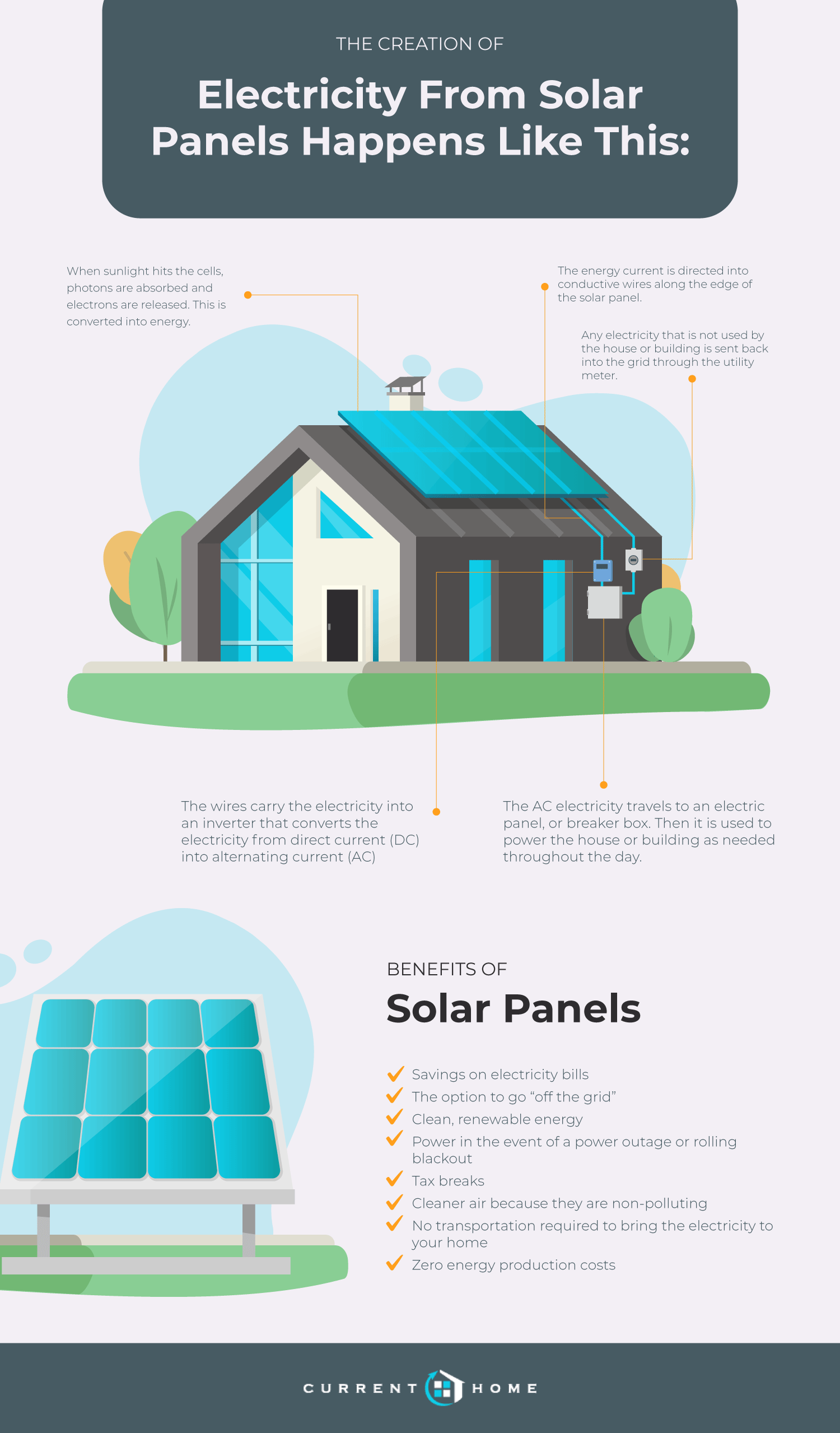Chances are you’ve heard of solar panels and their environmental benefits, and you’ve seen them appear on roofs across your neighborhood. Solar panels offer sustainable electricity by generating power from the sun that can be used to provide electricity in a home. How do solar panels work? What benefits come with installing them on the roof of your Southern California home?
The Science Behind How Solar Panels Work
Solar panels are made up of many tiny cells, called photovoltaic cells, that are linked together. These cells are constructed from layers of semiconductive wafers—typically silicon—framed by metal and encased in tempered glass. One layer of each cell is positively charged, and the other is negatively charged. The role of these cells is to draw power from sunlight that will be converted into electricity.
So how do solar panels work?
The creation of electricity from solar panels happens like this:
- When sunlight hits the cells, photons are absorbed and electrons are released. The positively and negatively charged layers in the photovoltaic cells create an electrical field, which creates an energy current that allows these electrons to move toward conductive metal plates framing the cell.
- The energy current is directed into conductive wires along the edge of the solar panel.
- The wires carry the electricity into an inverter that converts the electricity from direct current (DC), the type of electricity collected by the solar panels, into alternating current (AC), the type used to power buildings.
- The AC electricity travels to an electric panel, or breaker box. Then it is used to power the house or building as needed throughout the day. Lights, appliances, and other electric devices inside the house will be powered by electricity generated from solar panels.
- Any electricity that is not used by the house or building is sent back into the grid through the utility meter, which measures the flow of electricity. When a property is creating more electricity than it is using, the amount saved will be credited on the electric bill. When solar panels are not creating electricity, such as at night time, the property will draw power from the grid. Alternatively, homeowners may opt to store excess electricity in a solar battery to use on cloudy days, at night, during a blackout, or in case of emergency.
Benefits of Solar Panels
Solar panels are an amazing technology that puts sustainable electricity within reach of any homeowner. So now that we’ve learned how solar panels work for your home, why exactly should you consider switching to solar? The benefits of solar panels include:
- Savings on electricity bills. Using solar energy can lower your utility rates by reducing your reliance on the local grid. Here’s how to calculate your potential savings.
- The option to go “off the grid.” You could install a solar panel system large enough to power your entire home, allowing you to be entirely self-sufficient. This is especially advantageous if you choose to reside in a rural region without access to stable energy infrastructure.
- Clean, renewable energy. Since sunlight is a renewable energy resource, solar panels also help reduce your consumption of non-renewable energy like fossil fuels.
- Power in the event of a power outage or rolling blackout. Storing extra energy in solar batteries lets your home have emergency power in case of outages.
- Tax breaks. Installing solar panels for your home or business makes you eligible for the federal solar tax credit. This lets you deduct 26 percent of the solar panel system’s cost from your federal taxes.
- Cleaner air because solar panels are non-polluting. The process of generating solar power doesn’t emit any greenhouse gases, unlike with fossil fuel power plants, allowing you to reduce your carbon footprint.
- No transportation is required to bring electricity to your home. Solar energy doesn’t require refueling to keep running, unlike alternative off-grid energy sources like natural gas for generators. You don’t need to hire a fuel delivery service to come to your location regularly.
- Zero energy production costs. Besides being self-sustainable, your home can be one step closer to being completely waste-free if you set up a solar panel system that produces the right amount of power to meet all your energy needs.
How Many Solar Panels Do You Need to Run a Home?
We may now know how home solar panels work, but how many should you install?
There isn’t any fixed number on the panels that you should install in your home. Instead, the number of solar panels that you need to install to power an entire home depends on several factors, including:
- Your household’s average energy consumption per year. The higher your power usage, the higher the amount of energy the solar panel system generates.
- The type of solar panel. The number of panels you need also depends on the kind you want to buy. Solar panels have varying designs and sizes, which affect their average power output.
- The location and hours of sunlight each day. The more sunlight your home gets, the more power one panel can generate. But that also means you might need several panels to catch enough sunlight if you live in a less sunny area, like living close to tall trees.
A solar panel installation professional can evaluate your home to determine a system setup that best suits your home’s consumption needs.
How Long Do Solar Panels Last?
In general, solar panels last around 25-30 years, but depending on their condition, they could last longer. But that doesn’t mean solar panels will suddenly stop working after exceeding their life expectancy. As its components slowly degrade, the panels’ power output will also diminish gradually.
Can You Run Solar Panels at Night?
As mentioned earlier, solar panels only generate power during the day when there’s sunlight. But you can still use the electricity at night by having solar batteries installed as well. These devices will store surplus energy for you to draw on when the solar panels aren’t making enough.
Do Solar Panels Need Servicing?
Solar panels don’t require much maintenance and repairs unless damaged by debris, fires, or bad weather. However, you will need to clean them at least two to four times a year. Anything obstructing the panels—even if it’s just a layer of dust—will prevent them from absorbing as much sunlight as possible.
If your panels’ output does start decreasing, scheduling service appointments at least once or twice a year will help keep the decline at a minimum for longer. To save money, make sure to check with your solar panel company if they provide free maintenance and repair services or if your warranty will cover the issue.
Make the Switch to Solar Today
Solar panels work to make the world greener, save you money, and provide a cheaper and sustainable energy alternative. Are you interested in saving money and powering your home with sustainable energy?
Get in touch with the team here at Current Home. We’ve provided custom energy solutions for California homeowners and businesses since 1991 and are always ready to help you with your energy needs.
Contact us today to get your free solar strategy scheduled and made for you. You can speak with us anytime to learn more about how home solar panels work.







